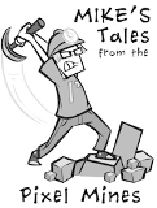Game Development Reference
In-Depth Information
'
'
exactly like your game in every way. You might think I
ll tell you that
you have nothing to worry about. The fact is that you can learn a lot from someone
else
m crazy, but I
s game simply by playing it, studying their graphics system, testing their user
interface, and finding other chinks in their armor. After all, you can still compile
your game, whereas they
'
'
ve shipped it and probably moved on to other things.
True, you won
'
t be the first to market. Yes, you
'
d better be no later than second
to market, and certainly you
t repeat their
mistakes. At least you have the benefit of having a choice, and you also have the
benefit of dissecting another competitor
'
s product before you put your game on the
shelf.
'
d better make sure that you don
'
Don
'
t Give Away All Your Secrets
They say that loose lips sink ships, right? This is certainly true in the game
industry. Strike Commander, Origin
s first 3D game, was due out in Christmas
of 1992. In the summer of 1992, Origin took Strike Commander to the big
industry trade show at the time, the Consumer Electronics Show, and made a
big deal of Strike Commander
'
s advanced 3D technology. They went so far as
to give away technical details of
'
the 3D engine, which the competition
immediately
s
competitive advantage was trumped by their own marketing department, and
since the team had to slip the schedule past Christmas, the competition had
more time to react. What a disaster!
researched and
installed
in their
own
games. Origin
'
'
'
The game industry tends to follow trends until they bleed out. That
s
a surprisingly strong aversion to unique content on the part of game executives. If a
particular game is doing well, every company in the industry puts out a clone until
there are 50 games out there that all look alike. Only the top two or three will sell
worth a damn, so make sure you are in that top two or three.
s because there
There
or Is There?
Sometimes, you have to admit there
'
s No Way Out
—
'
s a grim reality
—
your game has coded itself into
a corner. The testers say the game just isn
t any fun. You might have gone down a
dead-end technology track, such as coding your game for a dying platform.
What in the hell do you do now?
Mostly, you find a way to start over. If you
'
re lucky, you might be able to recycle
some code, art, map levels, or sounds. If you
'
re really lucky, you might be able to
replace a minor component and save the project. Either way, you have to find the
courage to see the situation for what it is and act. Putting your head in the sand
won
'
'
t do any good.



